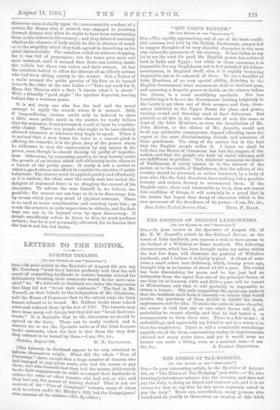"QUO TISQUE TANDEM."
[To THE EDITOR Or THE 4. SPECTAT011:1 SIn,—The rapidly approaching end of one of the least credit- able sessions ever held by the British Parliament, cannot fail to suggest thoughts of no very cheerful character to the man who values the greatness of his country. It has fallen to my lot to see the work for good the English power has achieved both in India and Egypt ; but while in those countries it is impossible for any Englishman not to feel proud of his fellow- countrymen, in England itself, alas, it is rapidly becoming impossible not to be ashamed of them. To see a handful of Irish Members, of no very special ability, dictating to the English Government what measure sit shall or shall not pass, and assuming a despotic power to decide on the clauses before the House, is a most mortifying spectacle. Not less humiliating is it to see the Government looking helplessly to the Lords to get them out of their serapes, and then, them- selves indebted to the Upper House for place and power, turning round and throwing rand at their deliverers. But pitiable as all this is, the mere clamour of men like some at least of the Irish Members, or even the humiliation of Mr. John Morley, or the silence of Mr. Asquith, would not be of any particular consequence, beyond affording cause for regret to the most discriminating friends and admirers of those gentlemen. The sting of the matter lies in the fact that the English people suffer it. I know we shall be told that the House of Commons has loot the respect of the nation, and that the people arc bent on social reforms, and are indifferent to politics. Yet, whatever measures we desire of Parliament, it surely cannot be to the interest of the nation, or to the credit of Englishmen, that the affairs of the country should be governed, or rather hindered, by a body of men who, like the Irish Members, have nothing but a possible honesty and certain fluency to recommend them. If the English voter, silent and inscrutable as he is, does not resent this condition of things, it will certainly be a proof that in the nation has begun that decay of character which is the sure precursor of the decadence of its power.—I am, Sir, &c.,


































 Previous page
Previous page